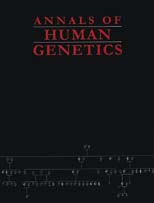Article contents
MUC1 gene polymorphism does not explain the different incidence of gastric cancer in Portugal and Denmark
Published online by Cambridge University Press: 01 May 1999
Abstract
MUC1 is a highly polymorphic mucin type glycoprotein expressed on the surface of many epithelia, including gastric mucosa, and is present in several body fluids and mucous secretions. A genetic polymorphism due to variation in length of a 60 bp tandemly repeated sequence domain constitutes more than half of the coding region of the glycoprotein. We demonstrated previously in a Portuguese population sample that the frequency of small MUC1 alleles is increased in patients with gastric carcinoma, suggesting that the possession of small MUC1 alleles confers increased risk for gastric carcinoma development. This finding raised the possibility that the very high prevalence of gastric carcinoma in Portugal could be partly due to a high frequency of small MUC1 alleles in the Portuguese population. In the present study we compared the MUC1 allele distribution in a population of Danish blood donors with the distribution in a population of Portuguese blood donors. The frequency of small MUC1 alleles was significantly higher in the Danish than in the Portuguese sample, thus failing to lend support to the hypothesis that a relatively higher frequency of the small MUC1 alleles might account for the high prevalence of gastric carcinoma in Portugal when compared to Denmark.
- Type
- Research Article
- Information
- Copyright
- © University College London 1999
- 9
- Cited by


